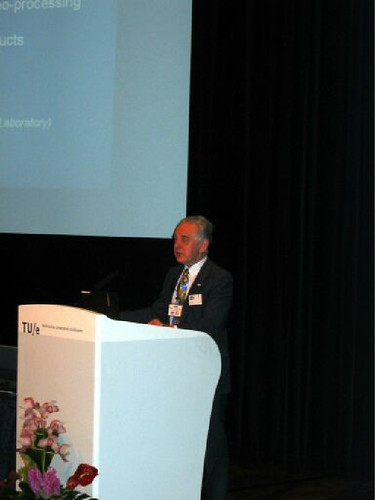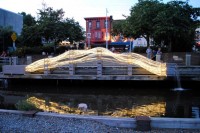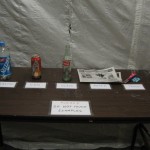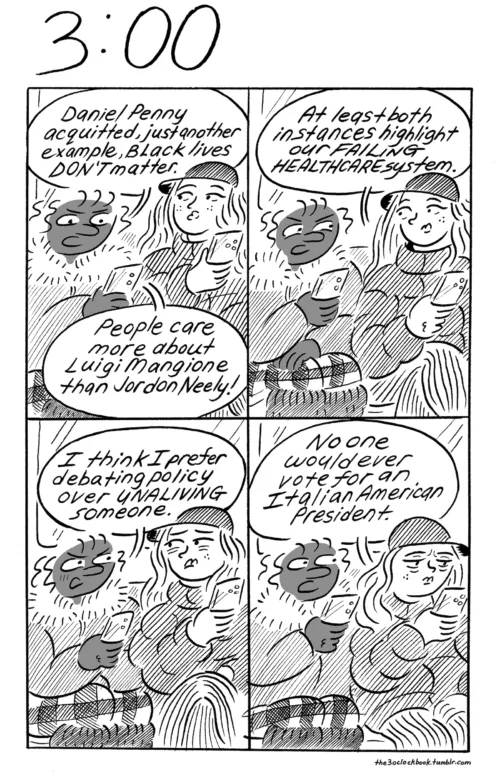Special Report on the lecture/discussion series organized by The Temporary Department for Academic Research (TDAR)
By K-Fai Steele
TDAR, The Temporary Department for Academic Research is a collective of Sarah Jacoby, James Weissinger, and Oliver Wunsch. For August 2008 they are PIFAS’s Artists-In-Residence. The Eric James Johnson Memorial Artist Residency coordinated by PIFAS faculty member Constance Mensh, has brought both national and international artists to Philadelphia since 2007. TDAR is the first group to hail from Philadelphia itself.
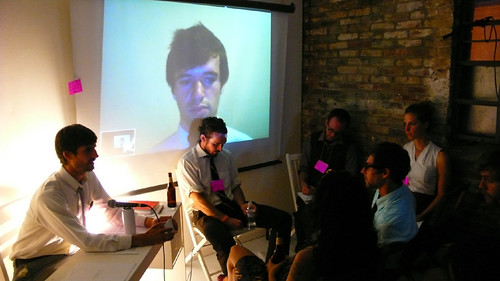
The front of the dioramic classroom: Richard Davis, Oliver Wunsch (on screen), Brandon Joyce, James Weissinger, and Sarah Jacoby (all with name tags). Photo by Constance Mensh.
TDAR is “a perpetually ad-hoc working group dedicated to the investigation of academia.” On August 7, 2008, they crammed about 20 adults into a very hot 8 x 12 foot “dioramic classroom” that they constructed at the Philadelphia Institute for Advanced Study, complete with white walls, a drop ceiling, desks and chairs. They had gathered to discuss “Each One Teach One” a 2006 essay written by the curator Florian Waldvogel about education in our culture. Wunsch was projected onto a large screen via Skype, and Jacoby and Wessinger sat at the front of the classroom with Richard Davis and Brandon Joyce, faculty members and co-founders of PIFAS.
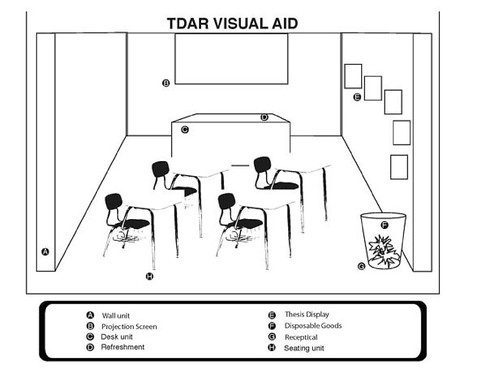
“Each One Teach One” was written by Waldvogel for a Manifesta Biennial that was to have taken place that same year. Wunch opened the discussion by presenting Waldvogel’s argument that there is a general apathy towards education, and that higher learning is often pre-professional: one (or one’s parents) pays $40,000 a year and expects to receive concrete results, whether it’s a skill, or a practical path to a job. Education is now a commodity and is not seen as a thing that is beautiful and perfect in and of itself. Davis commented that “education at its best should be its own self-improvement.” The goal of higher learning is to blend individual packets of education (e.g., Math class, English class, Biology) into what Waldvogel dubs “trans-disciplinary education,” which in simpler terms is blending all of your knowledge into one big pot. Education becomes a lifestyle, and according to Joyce, “helps us in our quest for horizon-widening and self-articulation” – it makes us more thoughtful people.
PIFAS and TDAR are two Edu-Cultural Collectives, groups of people who are curious, intelligent, playful, idealistic, and interested in learning without going deeply into debt for it. One of PIFAS’s goals is to offer free education handily, providing someone takes the initiative to lead a class or a discussion group. (A member of the audience mentioned that MIT’s classes are now online for free through MIT OpenCouseWare, and institutions such as Harvard are now offering full scholarships to students who would otherwise not be able to afford an education).
Since its inception in January of 2007, PIFAS has always included people with wide and varied interests who wanted to take part in a common space that was not necessarily an art space, but more of what Joyce calls a “Cultural Collective,” or a “Think-Tank”. “Calling the space an Artist Collective seems to be a misnomer,” according to Davis, who refers to PIFAS as “an ongoing experiment” whose direction is dependent on the individuals involved. “We’ve tried to make it a very democratic space.” This blended well with TDAR’s proposed discussion and lecture series. Jacoby and Weissinger refer to their residency as “a living space of discussion rather than a static exhibition space.”

PIFAS Co-Founders and Faculty Members Richard Davis and Brandon Joyce, photo by Constance Mensh.
Both TDAR and PIFAS thrive on what Davis called “Constructive Confusion” that is, using academic nomenclature that normally makes ones eyes involuntarily glaze over.
“It’s intentionally silly,” remarks Davis, “but that allows people to drop their preconceived notions of what an academic space is”. This is the crux of PIFAS and TDAR. Their collective sense of play allows for them to don the image of a stuffy, impenetrable place. Davis refers to this as “wearing your parents’ clothes”. PIFAS’s classes don’t follow the master-pupil model, but are what Joyce describes as “constant chatter” where it’s possible for a poetry society reading to evolve into a discussion about the philosophy of architecture.
PIFAS’s free play/free education philosophy differentiates it from collectives in Philadelphia that are more art-centric. PIFAS and its members don’t consider themselves constrained by concrete creative yields like art and music shows (though those things do happen there). Joyce said the best way he could describe PIFAS’s goal was through the German word “Bildung,” an education which encompasses teaching and learning specific skills, and also something less tangible but ultimately more profound: the sharing and encouragement of knowledge.
TDAR’s lecture and discussion series continue every Thursday night at 7:00PM through the rest of the month. August 14th 7PM: Workshop: “Test-Taking, Test-Making,” with Dr. John Muse, Haverford College’s Mellon Post-Doctoral Fellow for 2007-09 in the Fine Arts Department. August 21st 7PM: “Comic Books or Graphic Novels?” a lecture by artist N.C. Christopher Couch. August 28th 7PM: TDAR FINAL EXAM: The Art/Test and closing reception. More information can be found here. The Philadelphia Institute for Advanced Study is located at 1712 North 2nd Street in Philadelphia, by the intersection of 2nd and Cecil B. Moore. More information can be found at their website or questions can be directed to inquiry@pifas.net.
K-Fai Steele is a Philadelphia artist and an Emeritus of the Philadelphia Institute for Advanced Study. She can be contacted through her website.


